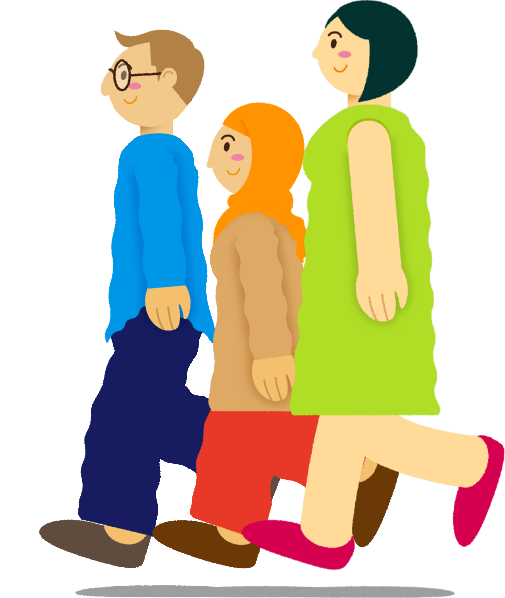 by Certified NPO Development Education Association (DEAR)
by Certified NPO Development Education Association (DEAR)
What is adult learning / education?
International Trends and Adult Learning and Education (ALE)


SDG4 and adult education
How is it related?
● Makiko Kondo Kondo / Makiko /
Takashi Miyake Miyake Takafumi
The SDG4 is positioned as a successor goal to the comprehensive EFA. The SDG4 is "Providing inclusive, fair and quality education for all and promoting lifelong learning opportunities." The SDG4 shows seven targets and three means of implementation. In addition, an indicator was set after the formulation. Indicators are criteria for monitoring the achievement of a target. Of the seven SDG4 targets, adult education is involved in 4.3-4.7.
About 4.3 and 4.4
4.3 and 4.4 are targets for technology education and vocational education. Above all, the connection with the profession after graduating from secondary education (junior high school / high school) is an important theme. UNESCO has been promoting measures as TVET (Technical and Vocational Education and Training) (* 1). The aim is to expand educational opportunities to acquire the skills necessary for human-like employment and, as a result, significantly increase the proportion of young people and adults with the necessary skills. UNESCO has issued a TVET strategic plan from 2016 to 2021 with the goal of contributing to the achievement of SDG4 (* 2).
(* 1) In 1999, the international center for UNESCO-UNEVOC (International Center for Technical and Vocational Education and Training) was established in Germany as a general term for education and training fields related to technology and vocation.
(※2)“Strategy for Technical and Vocational Education and Training(TVET)(2016-2021),”UNESCO,2016

Access to technology education, vocational education and higher education
Target 4.3 of the SDG is "By 2030, ensure that all men and women have equal access to high-quality technical and vocational education within reach and higher education, including universities." is. The index is "the percentage of young people or adults (25 to 65 years old) who have participated in school education or non-school education in the last 12 months." This index data for Japan is as low as 42% (48% for men and 35% for women) (2012) (* 3). Time and distance constraints are cited as reasons for low learning opportunities for adults. Nearly six out of ten adults do not have the opportunity to learn even once a year because they do not have time to learn or have no place to learn nearby. The role of NPOs that carry out social education facilities such as public halls and learning projects for adults is significant, and their promotion is necessary. It is also essential to achieve a work-life balance (working environment including wages and working hours is in harmony with life) through the efforts of employers.
In addition, Japanese technical and vocational training has the problem of being inconsistent with labor market needs. Eighty-nine percent of employers say it is difficult to hire talent, and 70% of workers say they need more training to get the job done (* 4).
Regarding equal access to higher education, there is still a disparity in the rate of enrollment in four-year colleges, 56% for boys and 50% for girls, and gender bias in the field of specialization is also an issue (Ministry of Education, Culture, Sports, Science and Technology " School Education Basic Survey (2018) ").
(* 3) Ministry of Foreign Affairs https://www.mofa.go.jp/mofaj/gaiko/oda/sdgs/statistics/goal4.html
(※4)OECD https://www.oecd.org/tokyo/newsroom/4UPDATED%20Future-ready-adult-learning-2019-Japan_J.pdf

Skills necessary for rewarding human-like work and entrepreneurship
Target 4.4 "significantly increases the proportion of young people and adults with the skills necessary for employment, rewarding human-like work and entrepreneurship, such as technical and vocational skills," and its indicator is "having ICT skills." Percentage of young people and adults. " There are various levels of ICT skills, but for example, the percentage of people who "can perform simple calculations such as addition and subtraction using spreadsheet software such as Excel and Open Office" is 65% (* 5). ..
Occupational skills include not only ICT skills set as indicators, but also various skills according to occupation. Also, not only the skills to be hired, but also the skills to start a business by oneself are required with the development of artificial intelligence.
In addition, in order to acquire vocational skills, "basic skills" such as reading, writing, and calculation are indispensable. On top of that, "life skills" ("highly versatile skills") such as self-esteem, problem-solving, communication, creative thinking, and empathy with others are required (* 6). These skills are not only the ability to start a business, but also the skills to empower people and improve society, and the promotion of adult education in the field of life skills is required.
(* 5) Ministry of Foreign Affairs https://www.mofa.go.jp/mofaj/gaiko/oda/sdgs/statistics/goal4.html
(※6)UNESCO http://jnne.org/doc/2012_gemr_summary_2_japanese.pdf

Eliminating gender disparities and access to education for vulnerable groups
4.5 is an educational guarantee for social minorities. Minority not only means a minority of numbers, but is also a socially vulnerable entity due to relationship of power. Women, sexual minorities, foreign nationals, people with disabilities, indigenous peoples, low-income groups, etc., but also those with chronic illnesses, those who have not attended school, young carers (from a young age) There are minorities who have difficulty accessing education, such as those who have taken care of their families) and those who are abused. Even if there is an educational guarantee for those who can (access) it in the presence of a strong school system, the educational guarantee for those who cannot access it is insufficient because of its strength. In other words, being unable to attend school makes it difficult to have a stable work life.
Adult literacy
Target 4.6 is "to enable all young people and the majority (both men and women) of adults to acquire literacy and basic computing skills." The Government of Japan reports that both literacy and computing ability are 99%, but this data includes data for illiterate people, people with intellectual and mental disabilities, and people with language problems (mainly foreigners). Is not included (* 7). In the first place, no nationwide literacy survey has been conducted in Japan for more than 70 years since 1948. A national literacy survey including resident foreigners should be conducted at an early stage to understand the actual situation of literacy and calculation ability. In addition to setting up one public junior high school night club in one prefecture, which has only 36 schools nationwide, it can also be set up in core cities, introduce a communication system, and support voluntary night junior high school by volunteers. The Law for Securing Educational Opportunities should be revised. This makes it possible to provide learning opportunities for those who have not completed compulsory education and formal graduates.
(* 7) National Institute for Educational Policy Research https://www.nier.go.jp/04_kenkyu_annai/pdf/piaac_summary_2013.pdf
Knowledge and skills to promote sustainable development
4.7 shows the specific value that can be acquired to promote sustainable development through education. Its education includes sustainable development, sustainable lifestyles, human rights, gender equality, promotion of a culture of peace and nonviolence, global citizenship, cultural diversity and contribution to the sustainable development of culture. Is to learn. In the index, school education for children is strongly conscious, but it is recommended that sustainable development be implemented concretely in the practice of adult education, which is the field of community development and social development. It will be the process itself. Because adults build their lives with global citizenship, eliminate human rights violations and discrimination in regions and organizations, achieve gender equality, peace and nonviolence cultures, cultural diversity and respect for cultures. This is because creating regions and organizations based on the above promotes sustainable development. To do so, you need to learn what is blocking them, what the current challenges are, and acquire the knowledge and skills to tackle those challenges.
Problems with SDG4
CSOs (civil society organizations) that support adult education and learning around the world have pointed out some problems that these SDG4s are not centered on peripheral people such as the poor and minorities. increase. These problems are, for example, (1) included in the viewpoint of lifelong learning, and are not particularly mentioned as problems of adult learning / education. And (2) do not take a critical view of education privatization and consumerism, which creates disparities and keeps away from guaranteeing the quality of education. In addition, (3) promotion of public education security to peripheral people and dissemination of literacy and basic education are not strongly shown. Behind these problems is the wide range of people who are expected to be targeted because the SDGs have adopted a "universalist" policy. Even if the SDG4, which has such problems, is inadequate, as long as the target person is listed as "all" in the above goals, it will be marginalized to indicators and monitoring targets. It is necessary to position the issues of people and institutional security.
What are the 2015 Recommendations for Adult Education?
● Kazuaki Tani / Kazuaki /
Makiko Kondo Kondo / Makiko
The "Adult Learning and Education Recommendations (RALE)" is the only international law in the field of adult education adopted by the 38th General Assembly of UNESCO in 2015. Although it is not as legally binding as the treaty, the governments of member countries, including Japan, are required to make the text known to the public and make every effort to realize it.
RALE is a revision of the "Recommendations for the Development of Adult Education" adopted at the 19th General Assembly in 1976, but it is a completely new document that reflects the changes in society for nearly 40 years. The 1976 Recommendation clarifies that adult education, which is the core of lifelong education, is a public issue required by the times against the backdrop of global economic growth and the rise of mass movements since the 1960s. It was a document that systematically presented the necessary measures. The goals, challenges and measures set forth there have not lost their significance as policy norms for adult education.
Nonetheless, the expansion of public spending on adult education, which the 1976 Recommendation envisioned, stalled at the beginning of the low-growth era, and since the 1980s public spending on adult education has rather been under the financial crisis. Will be curtailed, privatizing facilities and reducing professional staff. And with the rise of neoliberalism, the development of adult education as a public issue becomes "unreal". In that sense, RALE is oriented towards measures that can demonstrate the social benefits of adult education against the reality of expanding market fundamentalism and reducing public spending. This shows that half of the space is devoted to measures related to the five areas of activity common to all businesses: policy, governance, finance, participation / inclusion / fairness, and quality (Note). The emphasis is on building an information collection and evaluation system that regularly monitors the realization of these measures.
In RALE, as the central learning areas of adult education that addresses today's educational, cultural, political, social, and economic issues, (1) literacy and basic education, (2) continuous education and specialized development (vocational skills), ③ Liberal / People / Community Education (Active Citizenship Skills) was presented. These should not be independent of each other, but should develop the formation of vocational skills and active citizenship skills as literacy education, and should develop the abilities of literacy and active citizenship as vocational skills, and should be active. Literacy education and vocational education to cultivate citizenship skills are envisioned.
RALE provides important guidelines for the future development of quality adult education.
(Note) The five areas are clarified in the "Belem Action Framework" adopted at the 6th UNESCO International Conference on Adult Education (held in Belem, Brazil), and serve as the axis for evaluating the progress of adult education measures in each country.
Knowledge and skills to promote sustainable development
● Naomi Uejo Kamijo / Naomi
Education for Sustainable Development (ESD) is an education that fosters leaders in the creation of a sustainable society. Under Agenda 21 (see “1987” in the table), which is the basis of ESD, education for sustainable development is important for “enhancing the capacity of citizens” and in both formal and non-formal education. "Citizen participation in decision making" is emphasized as essential. ESD is also mentioned as a "lifelong learning process" in "Education for Sustainable Development: Achieving the SDGs (ESD for 2030)" (see "2020" in the table). ..
SDG4.7 advocates the dissemination of education based on sustainability and the value of peace and human rights, and promotes ESD and development education, peace education, human rights education, environmental education, gender education, global citizenship education, etc. Is stated to be the basis for achieving the SDGs. And it is stated that those educations should be carried out for "all learners".
Brief history of ESD
| year | Events |
|---|---|
| year 1987 | The concept of sustainable development was presented in the report "Our Common Future" published by the "World Commission on Environment and Development (Brundland Commission)". |
| 1992年 | The United Nations Environmental Development Conference (UNCED, "Earth Summit") was held in Rio de Janeiro (Brazil), the action plan "Agenda 21" was adopted, and in Chapter 36 "Education, People's Awareness, Promotion of Training". It included the importance of education for sustainable development and guidelines for its efforts. |
| year 2002 | In the process of negotiating the implementation plan of the "World Summit on Sustainable Development (Johannesburg Summit)" (hereinafter referred to as the "World Summit on Sustainable Development"), the Japanese government made a proposal from the Japanese NPO. "A Decade of Education for Sustainable Development" was proposed and included in the implementation plan. Adopted at the United Nations General Assembly in September. |
| 2005-2014 | Implementation of the United Nations Decade of Education for Sustainable Development (ESD Decade). |
| year 2013 | The 37th UNESCO General Assembly adopted the Global Action Program on Education for Sustainable Development (GAP) as a successor to the United Nations Decade of ESD. |
| Year 2014 | The World Conference on Education for Sustainable Development (ESD), which summarizes the Decade of ESD, will be held in Okayama and Nagoya. Clarified the promotion of GAP in the "Aichi / Nagoya Declaration". GAP adopted at the 69th United Nations General Assembly. |
| 2015-2019 | Promote ESD based on GAP. |
| 2019年 | At the 40th UNESCO General Assembly, "Education for Sustainable Development: Toward the Realization of SDGs (ESD for 2030)" was adopted as the successor framework to GAP. Adopted at the 74th United Nations General Assembly. |
| 2020年 | UNESCO publishes "ESD for 2030 Roadmap". |
| 2021年 | ユネスコとドイツ政府の共催による「持続可能な開発のための教育(ESD)に関するユネスコ世界会議」が開催。ESDはSDGs達成の鍵であるとする「ESD に関するベルリン宣言」を採択。 ※この会議は当初は2020年に開催予定だったのが、コロナのため延期開催。 |
Non-formal education corresponds to the concept of social education and lifelong learning in Japan. It refers to atypical education such as lectures and workplace training held by public halls and social education facilities other than school education (see " How is adult education developed in Japan? "). The practice of ESD in social education is a very modern challenge. Social education is a learning activity that local residents carry out rooted in living issues and regional issues, and its premise is to value democracy and the values such as equality, human rights, and freedom that are the basis of it, and create a better future. There is a thing to develop the power to grow. Of the five fields (* 1) listed as priority action fields for ESD, the local community (promoting the participation of local communities in ESD) is a field in which social education should play an important role. In Japan, as a result of economic priority town development, the local community is declining, and since 2000, citizen participation type town development has been carried out by NPOs, local governments, etc. as a new movement. However, it is necessary to properly examine whether or not the above-mentioned idea of social education is embodied there.
Another practical issue in promoting ESD is the inherent debate about what sustainability is. As a recognition of the current state of ESD for 2030, he cites the crisis of climate change and environmental sustainability, and clearly states that it is a product of human behavior and attitude. Unsustainability is our responsibility and it is a problem that we have to change our behavior. However, education that requires moral behavioral changes such as scientific understanding and protection of the global environment to solve environmental problems is not sufficient, and it is a big issue that ESD practice tends to be biased toward environmental education in the first place. is. In the outcome document of the CONFINTEA VI Interim Conference held in South Korea in 2017, "Adult learning and education guarantees adult participation in learning, thereby democratic value and peace through empowerment and active citizenship. , It is necessary to promote human rights. Therefore, ESD and GCE (Global Citizenship Education) should be cultivated. "(* 2). The lives of people who share democratic values, are peaceful, and have human rights are essential to a sustainable society. It is required to promote all educational and learning activities in SDG 4.7 and to reconstruct the local community including the environment and the whole society.
(* 1) Five priority areas of action are 1) policy support (policy support for ESD), 2) institutional comprehensive approach (comprehensive approach to ESD), and 3) educators (educators who practice ESD). (Fostering), 4) Youth (supporting the participation of young people in ESD), and 5) Local communities (promoting the participation of local communities in ESD). (* 2) https://unesdoc.unesco.org/ark:/48223/pf0000261223/PDF/261223eng.pdf.multi





